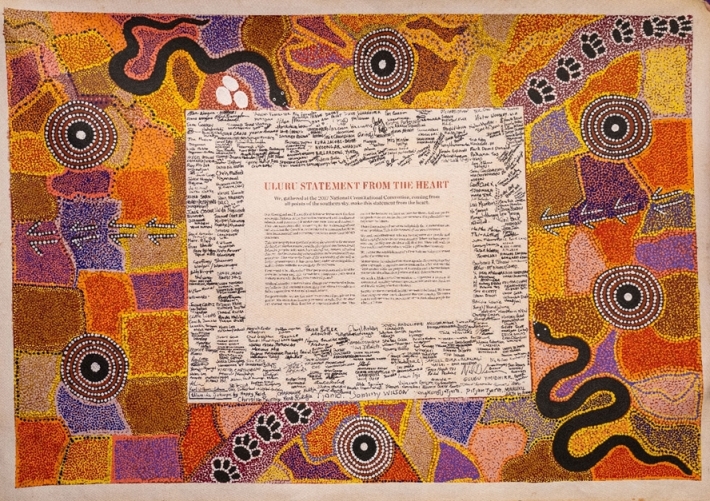The Voice Referendum set for 14 October, 2023
“Yes” vote
An Indigenous Voice in the Constitution “came from the people and it will be decided by the people,” asserted Mr Albanese. "In the words of the Uluru Statement from the Heart, ‘when we have power over our destiny, our children will flourish’. That's the change that we as Australians can make happen."
Professor Megan Davies, co-chair of the Uluru Dialogues and a Thomson Reuters author, also spoke at the event and said the Voice will be fit for purpose, bringing “positive empowerment” for Aboriginal and Torres Strait Islanders and better quality of laws.
“We invite our fellow Australians to listen to us, walk with us, and help us have recognition through a Voice,” said Ms Davies. “A vote for no is a vote for no change and the status quo will remain.”
Ms Davis stated that with the Voice, First Nations peoples will have a seat at the table. “Recognition means an active role in better quality laws and our communities will flourish if they have control over their lives,” she said.
“No” vote
“No” supporters believe the Voice to Parliament is divisive and elitist. “It is that old rule of divide and conquer that I can't stand for,” said Shadow Minister for Indigenous Australians, Jacinta Nampijinpa Price as she responded to the Prime Minister’s speech. “I'm not going to allow a line to run through the middle of my family within our constitution.”
Warren Mundine, “No” campaign leader, stated that the “Yes” camp was seeking to portray the Voice body as a "magic wand that will solve all problems" which “can only be solved by economic participation: kids in school, adults in jobs, business creation and home ownership".
Critics of the Voice also say the government hasn’t provided enough specific details on the Indigenous body that will advise the Commonwealth. It could be expensive and too bureaucratic.
“I don’t think people should be bullied into a position,” commentated Peter Dutton, Leader of the Opposition. “If you don’t understand, if you don’t know the detail, if you don’t really have your questions answered in relation to the Voice – if you don’t know, vote ‘no’.”
Those on the ‘vote no sovereignty movement’, such as Lidia Thorpe, federal senator for Victoria, think the Voice is tokenistic, does not empower Indigenous people and “is another step in the process of assimilation”.
Constitutional change
The Australian Constitution (under section 128) can only be changed once a bill is passed by a majority of both Houses of Parliament and by a majority of referendum voters in four of the six states.
On 19 June, 2023 Parliament passed the Constitution Alteration (Aboriginal and Torres Strait Islander Voice) 2023 Bill.
In this bill a new Chapter IX is planned to be added at the end of the Constitution. An Aboriginal and Torres Strait Islander “Voice” is part of this recognition. This will be a body to advise Parliament and the Executive Government on issues of importance to Indigenous communities.
The proposed change to the Constitution is:
Chapter IX Recognition of Aboriginal and Torres Strait Islander Peoples
s. 129 Aboriginal and Torres Strait Islander Voice
In recognition of Aboriginal and Torres Strait Islander peoples as the First Peoples of Australia:
1. There shall be a body, to be called the Aboriginal and Torres Strait Islander Voice;
2. The Aboriginal and Torres Strait Islander Voice may make representations to the Parliament and the Executive Government of the Commonwealth on matters relating to Aboriginal and Torres Strait Islander peoples; and
3. The Parliament shall, subject to this Constitution, have power to make laws with respect to matters relating to the Aboriginal and Torres Strait Islander Voice, including its composition, functions, powers and procedures.
Referendum
Voters will be asked to support the change to the Constitution:
“A Proposed Law: To alter the Constitution to recognise the First Peoples of Australia by establishing an Aboriginal and Torres Strait Islander Voice.
Do you approve this proposed alteration?”
The Australian Electoral Commission (AEC) has set up a dedicated Referendum 2023 website with information on how to vote, FAQs and the “Yes”/“No” opinions.
Background
A “First Nations Voice" was developed by over 250 Indigenous delegates at the National Constitutional Convention of First Nations Peoples in 2017. Created at this convention, the one-page Uluru Statement from the Heart states the Aboriginal and Torres Strait Islanders wish for constitutional recognition and a voice that will be listened to by parliament.
South Australia was the first place to establish a state Voice to Parliament. The SA government said it had planned the local Indigenous body to be operating before the referendum to show the benefits of a Voice. However, in June the government placed its plans on hold until the referendum is decided.
In Victoria a First Peoples Assembly was created in 2019. The Yorrook Justice Commission has been set up to engage in truth telling. A Treaty is also being developed between Indigenous peoples and institutions.
History of referendums
Australians last voted in a referendum twenty-four years ago. In 1999 a referendum on whether our nation should become a republic was voted on and failed.
Only eight changes to the Constitution have been approved by Australian voters via referendum since 1901. This includes nineteen referendums proposing 44 changes.
Over 90% of Australians supported the 1967 referendum to amend the Constitution to have First Nations people included in the census and be officially recognised as part of the population. Only a “Yes” case for the referendum was created by the government because all parliamentarians supported the Constitution Alteration (Aboriginals) Bill.
Legal commentary
Westlaw has published information on all elements of this important and history-making referendum. The latest Public Law Review Journal (Volume 34) has devoted an entire issue to the Voice. Sophie Rigney writes an in-depth article on the history and wording of the constitutional amendment, the Voice’s ability to speak to both Parliament and executive government, and the role of Parliament in the design of the Voice: The Proposal for the Voice to Parliament: Placing the Referendum Proposal in Context, (2023) 34 Public Law Review 110.
The Australian Law Journal recently published “Yes” and “No” content. The Voice - A Step Forward for Australian Nationhood by the Hon Robert French AC and Professor Geoffrey Lindell AM supports the “Yes” vote by emphasising the moral and positive advantages of a group of First Nations people working together on the common good of their communities. The authors stress the advisory capacity of the Voice, which they say will not impose a constitutional legal obligation in Parliament.
Professor James Allan directly counters French and Lindell’s points in Very High Risk, Very Low Reward: The Voice Referendum Deserves to Be Defeated. He believes the Chapter IX constitutional change is too vague, possibly enabling many High Court challenges. Furthermore, a powerful Voice body might overstep its remit and influence Parliament on a wider range of issues affecting non-Indigenous people.
Westlaw
Keep abreast of the Voice developments with Westlaw by selecting NewsRoom or Alert24 - Press Gallery keyword alerts delivered straight to your email inbox.
Indigenous case law research on Westlaw is easily conducted by using the Key Number System: 1 - Aboriginal and Torres Strait Islander peoples.
For any research queries on using Westlaw Australia go to the Customer Portal: https://support.thomsonreuters.com.au/product/new-westlaw-australia or contact the Training and Support team: LRA.Trainers@thomsonreuters.com.
To sign up for Alert24 or NewsRoom subscriptions contact the Customer Service team: Care.ANZ@thomsonreuters.com.

